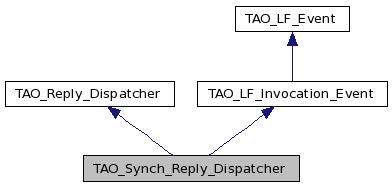Reply dispatcher for Synchronous Method Invocation (SMI)s. More...
#include <Synch_Reply_Dispatcher.h>


Public Member Functions | |
| TAO_Synch_Reply_Dispatcher (TAO_ORB_Core *orb_core, IOP::ServiceContextList &sc) | |
| Constructor. | |
| virtual | ~TAO_Synch_Reply_Dispatcher (void) |
| Destructor. | |
| TAO_InputCDR & | reply_cdr (void) |
| Return the reply CDR. | |
| virtual int | dispatch_reply (TAO_Pluggable_Reply_Params ¶ms) |
| virtual void | connection_closed (void) |
| virtual void | reply_timed_out (void) |
Protected Attributes | |
| IOP::ServiceContextList & | reply_service_info_ |
| The service context list. | |
Private Attributes | |
| TAO_ORB_Core * | orb_core_ |
| Cache the ORB Core pointer. | |
| char | buf_ [ACE_CDR::DEFAULT_BUFSIZE] |
| The buffer that is used to initialise the data block. | |
| ACE_Data_Block | db_ |
| TAO_InputCDR | reply_cdr_ |
Reply dispatcher for Synchronous Method Invocation (SMI)s.
Definition at line 44 of file Synch_Reply_Dispatcher.h.
| TAO_Synch_Reply_Dispatcher::TAO_Synch_Reply_Dispatcher | ( | TAO_ORB_Core * | orb_core, | |
| IOP::ServiceContextList & | sc | |||
| ) |
Constructor.
Definition at line 16 of file Synch_Reply_Dispatcher.cpp.
: reply_service_info_ (sc), orb_core_ (orb_core), db_ (sizeof buf_, ACE_Message_Block::MB_DATA, this->buf_, this->orb_core_->input_cdr_buffer_allocator (), this->orb_core_->locking_strategy (), ACE_Message_Block::DONT_DELETE, this->orb_core_->input_cdr_dblock_allocator ()), reply_cdr_ (&db_, ACE_Message_Block::DONT_DELETE, TAO_ENCAP_BYTE_ORDER, TAO_DEF_GIOP_MAJOR, TAO_DEF_GIOP_MINOR, orb_core) { // As a TAO_LF_Event we start in the active state.... this->state_changed_i (TAO_LF_Event::LFS_ACTIVE); }
| TAO_Synch_Reply_Dispatcher::~TAO_Synch_Reply_Dispatcher | ( | void | ) | [virtual] |
| void TAO_Synch_Reply_Dispatcher::connection_closed | ( | void | ) | [virtual] |
Definition at line 126 of file Synch_Reply_Dispatcher.cpp.
{
this->state_changed (TAO_LF_Event::LFS_CONNECTION_CLOSED,
this->orb_core_->leader_follower ());
}
| int TAO_Synch_Reply_Dispatcher::dispatch_reply | ( | TAO_Pluggable_Reply_Params & | params | ) | [virtual] |
Definition at line 58 of file Synch_Reply_Dispatcher.cpp.
{
if (params.input_cdr_ == 0)
return -1;
this->reply_status_ = params.reply_status ();
this->locate_reply_status_ = params.locate_reply_status ();
// Steal the buffer, that way we don't do any unnecesary copies of
// this data.
CORBA::ULong const max = params.svc_ctx_.maximum ();
CORBA::ULong const len = params.svc_ctx_.length ();
IOP::ServiceContext* context_list = params.svc_ctx_.get_buffer (true);
this->reply_service_info_.replace (max, len, context_list, true);
if (this->reply_service_info_.length() > 0)
{
orb_core_->service_context_registry ().
process_service_contexts (this->reply_service_info_, *(params.transport_));
}
// Must reset the message state, it is possible that the same reply
// dispatcher is used because the request must be re-sent.
// this->message_state_.reset (0);
// Transfer the <params.input_cdr_>'s content to this->reply_cdr_
if (ACE_BIT_DISABLED ((*params.input_cdr_).start()->data_block()->flags(),
ACE_Message_Block::DONT_DELETE))
{
// Data block is on the heap, so just duplicate it.
this->reply_cdr_ = *params.input_cdr_;
this->reply_cdr_.clr_mb_flags (ACE_Message_Block::DONT_DELETE);
}
else
{
ACE_Data_Block *db = this->reply_cdr_.clone_from (*params.input_cdr_);
if (db == 0)
{
if (TAO_debug_level > 2)
{
ACE_ERROR ((LM_ERROR,
"TAO (%P|%t) - Synch_Reply_Dispatcher::dispatch_reply "
"clone_from failed\n"));
}
return -1;
}
// See whether we need to delete the data block by checking the
// flags. We cannot be happy that we initally allocated the
// datablocks of the stack. If this method is called twice, as is in
// some cases where the same invocation object is used to make two
// invocations like forwarding, the release becomes essential.
if (ACE_BIT_DISABLED (db->flags (),
ACE_Message_Block::DONT_DELETE))
{
db->release ();
}
}
this->state_changed (TAO_LF_Event::LFS_SUCCESS,
this->orb_core_->leader_follower ());
return 1;
}
| TAO_InputCDR & TAO_Synch_Reply_Dispatcher::reply_cdr | ( | void | ) |
Return the reply CDR.
Definition at line 46 of file Synch_Reply_Dispatcher.cpp.
{
return this->reply_cdr_;
}
| void TAO_Synch_Reply_Dispatcher::reply_timed_out | ( | void | ) | [virtual] |
Definition at line 52 of file Synch_Reply_Dispatcher.cpp.
{
// noop
}
char TAO_Synch_Reply_Dispatcher::buf_[ACE_CDR::DEFAULT_BUFSIZE] [private] |
The buffer that is used to initialise the data block.
Definition at line 82 of file Synch_Reply_Dispatcher.h.
Datablock that is created on the stack to initialise the CDR stream underneath.
Definition at line 86 of file Synch_Reply_Dispatcher.h.
Cache the ORB Core pointer.
Definition at line 72 of file Synch_Reply_Dispatcher.h.
CDR stream which has the reply information that needs to be demarshalled by the stubs
Definition at line 90 of file Synch_Reply_Dispatcher.h.
IOP::ServiceContextList& TAO_Synch_Reply_Dispatcher::reply_service_info_ [protected] |
The service context list.
Definition at line 68 of file Synch_Reply_Dispatcher.h.
 1.7.0
1.7.0